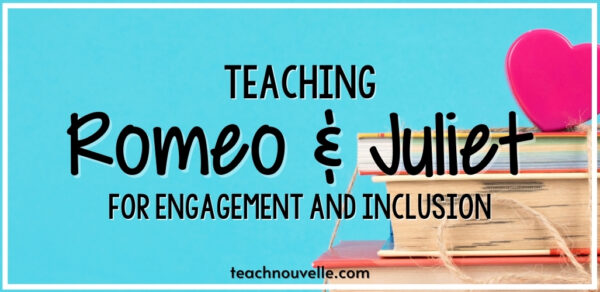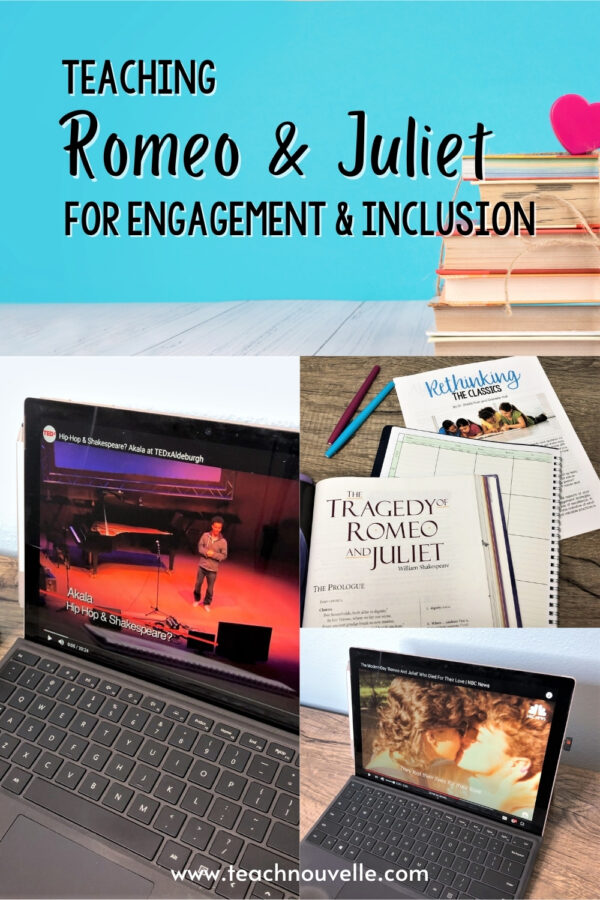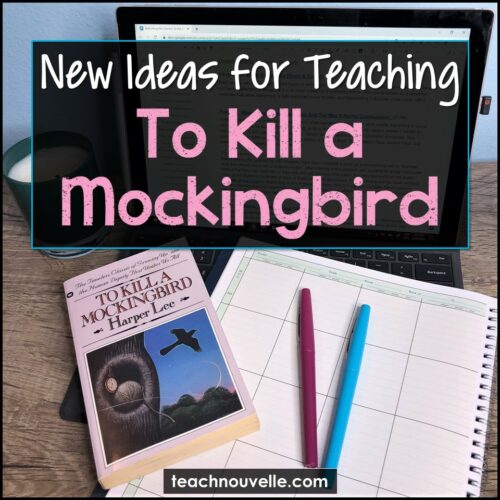How do I teach Romeo & Juliet? Let me count the ways! To me, it’s a timeless classic, but I know that many students struggle to connect with with story. Some students tell me it’s “corny” and “unrealistic.” Sometimes they’re thrown off by Shakespeare’s language. (More on teaching Shakespeare’s language here!) But that doesn’t mean we should just give up on the bard!
In this post I’ll give tips for teaching Romeo & Juliet that make it more inclusive, engaging, and relatable to your students. And as a bonus, all of these ideas will work for virtual, hybrid, or in-person learning. (And these are just a few of my Romeo & Juliet ideas, you can find the rest in my full Rethinking the Classics: Romeo & Juliet resource.)
Teaching Romeo & Juliet:
Play a game!
Introduction to Shakespeare Digital Breakout
This game makes a fantastic intro to your Romeo & Juliet unit. Students get to explore the Globe Theatre, learn about Shakespeare’s life, and learn about the customs of Elizabethan London. (You can use this game 100% digitally, but if you decide to make the purchase, you will also get a paper version of the escape room for your hybrid or classroom-based learning.)
Romeo & Juliet Digital Escape Room
This is the perfect review activity for teaching Romeo & Juliet during distance learning. Students will review key plot points, take a quiz on “who said it,” and practice their close reading skills, all while collecting clues to solve a secret message. It also includes optional extension activities to practice both analytical and personal writing. Plus, students will love the stunning original artwork by Lady Knight Illustrations.
Examine a Modern Interpretation of Shakespeare
British Black and Asian Shakespeare (Art Installation)
This art installation (and festival from 2015) documents the contributions of Black and Asian actors to the Shakespearean stage. Some castings and productions have propelled modern social commentary through the lens of a classic play, while others have represented efforts to diversify the Shakespeare canon in the British (and international) imagination. Students can hear from the director on the project British Black and Asian Shakespeare.
Have a Classroom Discussion
Romeo and Juliet in Sarajevo (Documentary)
It may be difficult to find the original 90-minute episode of Frontline that features it, but this story is still worth sharing. Bosko Brkic, an Eastern Orthodox Serb, and Admira Ismic, a Muslim, met in high school and fell in love. In 1993, at 25-years-old, they died tragically on a bridge in “no-man’s-land.” This video (3:47), “The Modern-Day ‘Romeo & Juliet’ Who Died for Their Love”, gives an excellent overview if you can’t show the whole episode.
Discuss why the families of Bosko and Admira disagree with the comparison to Shakespeare. Why do you think the media latched onto the comparison? The idea of “star-crossed lovers” is a trope, or an often-/overused theme or device.
Exploring the “Star-Crossed Lovers” trope:
- As a group, list factors from the play that made the romance “doomed to fail.”
- Brainstorm other examples of this trope from books, movies, songs, and real-life.
- Each group member choses one example to consider further.
- How does this example compare to the factors you listed from Romeo & Juliet?
- In what ways does this example not fit the trope?
- Share your example with your group.
- As a group, discuss the advantages and disadvantages of using tropes in fiction or connecting real-life events to fictional tropes. What does the reader/listener gain from seeing a trope? What do they lose?
Explore Shakespeare’s Language
TED Talk: Hip Hop & Shakespeare (either 7:12 or 20:24)
You can use this talk to introduce iambic pentameter with any Shakespeare play. British rapper Akala shows the connection and fluidity of iambic pentameter and hip-hop. The first seven minutes are a quick introduction, while the rest of the talk addresses Shakespeare, class, and gatekeeping to knowledge:
“The times in which [Shakespeare] lived, you know, the chasm between rich and poor being larger than it is today, though we seem to be doing our best to recreate that chasm. But he was living in very tumultuous, very violent times and we really receive almost a sanitized vision of that violence, coloring our view of the past. We know over 90% of Shakespeare’s audience couldn’t read or write. So how is it that in the 21st century in Britain that he’s come to be viewed as almost the poster child for elitism, and even within that now we’re getting a debate: Did he even write his own plays? Because, of course, this comes down to who’s allowed to be the custodian of knowledge and who isn’t. Shakespeare was someone who didn’t go — He wasn’t Oxbridge. He’s seen — by some — they need to see him that way, as someone who’s not entitled to be a custodian of knowledge.”
This video is part of my Shakespeare Webquest, but it could absolutely be used as a standalone.
Final thoughts:
I hope this gives you some useful tips for making your unit on Romeo & Juliet even more engaging and inclusive. I’ve been working with Dr. Sheila Frye (from Teaching Literacy) on a project called “Rethinking the Classics” to help teachers find supplemental texts and curriculum updates. In addition to Romeo & Juliet, we’ve covered The Odyssey, The Outsiders, The Great Gatsby, The Giver, To Kill a Mockingbird, Shakespeare (for any play) and we have more to come. Don’t see the specific text you’re looking for? Reach out to me @nouvelle_ela and I’ll see if I can help 🙂
If you try any of my resources or ideas in your classroom, let me know! I’d love to hear how your students responded.
Happy teaching!







1 Comment
Abena
June 10, 2021 at 8:30 pmLove your ideas – so inspirational! I’ve shared this page on my own blog as I too try to reflect on how Shakespeare can be more meaningful and inclusive.